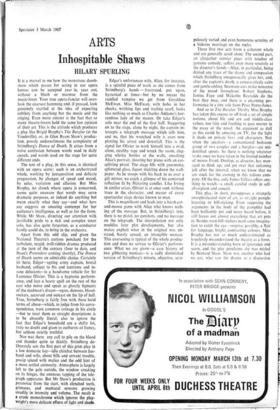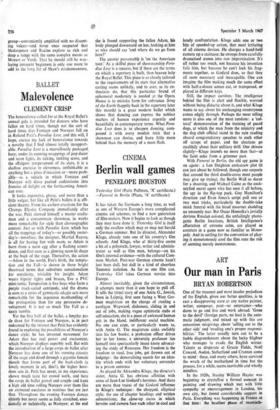Inhospitable Shaws ARTS
HILARY SPURLING
It is a marvel to me how the monstrous dumb- show which passes for acting in our opera houses can be accepted year in, year out, without a blush or murmur from the music-lover. Your true opera-fancier will over- look the coarsest hamming and, if pressed, look genuinely startled at the idea of expecting subtlety from anything but the music and the singing. Even more sinister is the fact that so many theatre-lovers hold the same low opinion of their art. This is the attitude which produces a play like Brigid Brophy's The Burglar (at the Vaudeville), or, in Glen Byam Shaw's produc- tion, grossly underestimates the complexity of Strindberg's Dance of Death. It arises from a naive confusion between words used in daily speech, and words used on the stage for quite different ends.
The text of a play, in this sense, is identical with an opera score: each is an orchestrated whole, working by juxtaposition and delicate progression, by changes of speed and mood, by echo, variation and allusion. But Miss Brophy, no slouch where opera is concerned, seems quite unaware that words may serve dramatic purposes, or indeed do anything but mean exactly what they say—and what hers say suggests an amazing contempt for her audience's intelligence, as well as for the form. While Mr Shaw, directing our attention with justifiable pride to a rich and complex tenor solo, has also quite forgotten, as a conductor hardly could do, to bring in the orchestra.
Apart from this odd slip, and given the National Theatre's curious penchant for the turbulent, turgid, troll-ridden dramas produced at the turn of the century (four to date, and Ibsen's Pretenders coming shortly), The Dance of Death seems an admirable choice. Certainly its hero, Edgar—ageing army captain, brutal husband, subject to fits and tantrums and in- sane delusions—is a handsome vehicle for Sir Laurence Olivier. This is a hypnotic perform- ance, and lays a heavy spell on the rest of the cast who move and speak as ghostly figments of the madman's dream—ogres, demons, blood- suckers, accursed and outcast on the lip of hell. True, Strindberg is fairly free with these lurid terms of abuse—which, to judge from his corre- spondence, were common coinage in his circle —but to treat them as straight descriptions is to be absurdly literal; also to ignore the fact that Edgar's household are a shifty lot, ratty no doubt and given to outbursts of frenzy, but seldom strictly truthful.
Nor was there any call to pile on the blood and thunder quite so thickly. Strindberg de- liberately sets the first part of this grim play in a low domestic key—idle chitchat between hus- band and wife, about bills and servant trouble, gossip spiced with malice and the odd hint of a more settled animosity. Atmosphere is largely left to the gale outside, the window creaking on its hinges, the ominous tapping of the tele- graph apparatus. But Mr Shaw's production is paranoiac from the start, with clenched teeth, grimaces, and maniacal screams growing steadily in intensity and voluine. The result is a crude monochrome which ignores the play- wright's more delicate effects of light and shade Edgar's unfortunate wife, Alice, for instance, is a spiteful piece of work as she comes from Strindberg's hands — frustrated, put upon, hysterical at times—but by no means the raddled vampire we get from Geraldine McEwan. Miss McEwan, with holes in her cheeks, writhing lips and trailing scarf, looks like nothing so much as Charles Addams's hor- rendous lady of the manor. Or take Edgar's solo near the end of the first half. Staggering on to the stage, alone by night, the captain in- tercepts a telegraph message which tells him, and us, that his wretched wife is even now plotting his arrest and downfall. This is the signal for Olivier to work himself into a mad, silent, stealthy rage and wreck the room, slug- ging whisky bottles at the walls, smashing Alice's portrait, shooting her piano with an ear- splitting pistol. The stage fills with gunsmoke, splintered glass, liquor trickling down the wall- paper. As he stoops with his back to us over a gilt mirror, we catch a glimpse of his contorted reflection lit by flickering candles. Like Irving in similar crises, Olivier is at once sunk without trace in the character, and master of every spectacular stage device known to man.
This is magnificent and leads into a harsh cat- and-mouse game with Alice who knows noth- ing of the message. But, in Strindberg's text, there is no pistol, no gunshots, and no message on the telegraph. The interpolation not only muddles later plot developments, but also makes explicit what in the original was un- stated, barely sensed, an intangible menace. This coarsening is typical of the whole produc- tion and does no service to Olivier's perform- ance. What we are given—a case history of two gibbering maniacs—is a sadly diminished version of Strindberg's minute, objective, scru-
pulously varied and even humorous scrutiny of a hideous marriage on the rocks.
These first two acts form a coherent whole and are generally acted alone. The second part, an altogether sunnier piece with touches of genuine comedy, suffers even more severely at the director's hands—Alice, in particular, being denied any trace of the shame and compassion which Strindberg unequivocally gives her, and, after the captain's death, a comparatively calm and gentle ending. Insensate cuts make nonsense of the mood throughout. Robert Stephens, Janina Faye and Malcolm Reynolds do the best they may, and there is a charming per- formance in a tiny role from Peter Penry-Jones.
And so to The Burglar. Thrifty Miss Brophy has taken this excuse to off-load a set of simple notions, about life and sex and middle-class values, too trite and footling to pass muster in the essay or the novel. An argument as dull as this could be amusing on TV, for the light it sheds on private lives and characters. Not when the speakers—a conventional bedroom group of two couples and a burglar—are uni- dentified spouts. So there is nothing whatever to do, once we have taken in the limited number of moves Frank Dunlop, as director, has man- aged to think up; and got over that sickening jolt after the interval, when we know that we are stuck for the evening in this tedious com- pany. Of the five, only James Villiers offers any- thing to watch—a small, careful study in self- absorption and conceit.
This play, in short, presupposes a strangely unsophisticated view of art, as straight pamph- leteering or bill-sticking. Even supposing the arguments in the body of the pamphlet had been brilliantly put and never heard before, it still leaves out almost everything that art puts in. Besides even bill-stickers need some imagina- tion to catch the eye—surprise possibly, a flair for language, bright, contrasting colours. Miss Brophy has not so much underestimated as hopelessly misunderstood the theatre as a form. It is a misunderstanding born of ignorance and scorn, and the play proclaims she was misled by Bernard Shaw. Shaw was another who had no ear, who saw the drama as a discussion
group—convenientl) amplified with no dissent- ing voices—and never once suspected that Shakespeare and Racine explore as rich and deep a range with the same complex means as Mozart or Verdi. That he should still be way- laying innocent beginners is only one more to add to the long list of Shaw's misdemeanours.



































 Previous page
Previous page